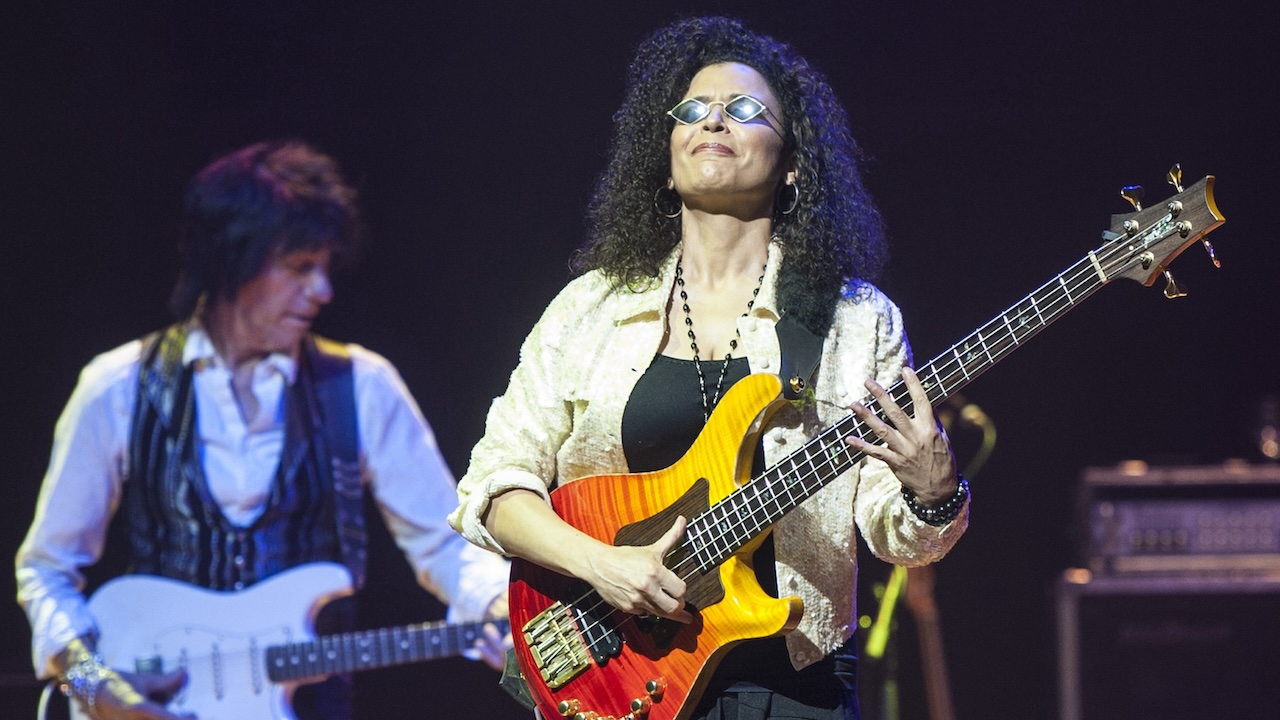
When you’ve got Rhonda Smith’s killer combination of Larry Graham-like funk chops, a full-on fusion background, the ability to play just about any kind of bass instrument imaginable, and sheer stage energy, word gets around.
For more than a decade, Smith was on call with Prince, but during the Purple One's 2010 sabbatical, she got a call from Jeff Beck drummer Narada Michael Walden. Unsure of Prince's future plans, Smith went with Beck, and had to tell his purple majesty she was busy when he got his mojo working again.
“They're both amazing guitar players,” Smith told Bass Player. “Prince was aware of everything; he could play everything, and had control over everything, so the bass needs to play a supportive role all the time, but Jeff let you take liberties. That was more of a rock and fusion gig, so there's room to expand.
“It doesn't mean I couldn’t go crazy. If I was screwing up, he would tell me, but he really trusted the people that he picked.”
Born in Halifax, Nova Scotia and raised in Montréal, Rhonda Smith first encountered the bass clef in elementary school, where she played the tuba-like euphonium.
At age 12, her older brother brought home a Sears bass guitar, and soon she was playing along with rock records by Yes, Rush, and Mahogany Rush. A year later, she was exploring fusion through the basslines and solos of Stanley Clarke's Rocks, Pebbles and Sand.
“Stanley was a huge influence because he had his own sound and was upfront in the music. Alain Caron and his band UZEB made fusion popular in Canada at the time, and of course, Jaco had a big impact on me.”
Our interview from the Bass Player archives took place in February 2012, with Smith having recently returned from a world tour with Jeff Beck.
Jeff Beck is one of the most technically gifted guitarists of all time. How do you relate to him in a performance?
“I can really relate to Jeff's playing because he doesn't use a pick, and neither do I. I'm a big believer in the sound of skin on strings. But the guy is so bad [in a good way] that I'll admit at times I have to not listen to his solos when we play live, because I'll lose my concentration. I prefer to study him at home in my studio.
“I listen to tapes of rehearsals when we're just blowing over stuff, looking at what dimension he's coming from as a soloist.”
What bass do you use as the workhorse with Jeff Beck?
“I do most of the show with the same kind of bass I used with Prince – a 4-string Fender American Deluxe Jazz Bass. I wanted to respect what had been laid down before me, and I knew Jeff would respect that. I use it in active mode with both pickups engaged, volume pegged, and just a bit of bass boosted.
“I love to play 5-string, but I haven't incorporated it yet because of my experience with Prince and Lenny Kravitz – they're not lovers of 5- or 6-string basses. I think some guitar players simply want you to play a 4 because they don't want all that other stuff in the way.
“I play my Vektor Electric Bassett electric upright on the few ballads, such as Over the Rainbow and Nessun Dorma – anything that's got room for people to hear the wood and the vibrato – in order to bring something more tender to the table. It's the same one I took on tour with Prince.”
Are you playing any fretless?
“I played some a couple of tours ago. I still have a fretless Deluxe Jazz on tour, but the songs I used it on, which are still in the set, have changed in such a way that I don't really need it anymore. I just roll back my tone knob and use the bridge pickup on the fretted Fender to cop somewhat of a Jaco-style sound.”
On Freeway Jam, you alternate between fingerstyle and some serious double thumbing. How do you apply that technique within your overall plucking-hand concept?
“I probably would be better off if my thumb was curved like a real bass player's thumb, but mine is very straight. So I've developed what I call a ‘top and bottom’ approach, where I strike down on the top of the string with tip of my thumb, and then I strike the bottom of the string on the way back up from underneath. Then I might incorporate some muted hammer-on notes with my left hand.
“I might add more action by plucking a higher string with my index finger – sometimes I use my first two fingers. And sometimes I'll thumb up and down on a string while I keep the plucking going on a higher string. Sometimes I'll even add a flamenco-like flick of all of my right-hand fingers on the G string.”
How has Prince influenced your bass playing?
“I don't think I could have had a better teacher. Canada was light on R&B and funk in the clubs and on the radio. From the outset he schooled me on a lot of music – guys like Larry Graham, James Jamerson, and Chuck Rainey.
“Plus, he's a phenomenal bassist – if he wants you to reproduce a feel, he comes over and plays it for you, so you need to be able do it on the spot!
“It's not something you can cop immediately, but by watching him over the years and being in such a funky environment, I've been able to assimilate some of his style. I think I play less and with more taste now, and I'm much more confident.”







